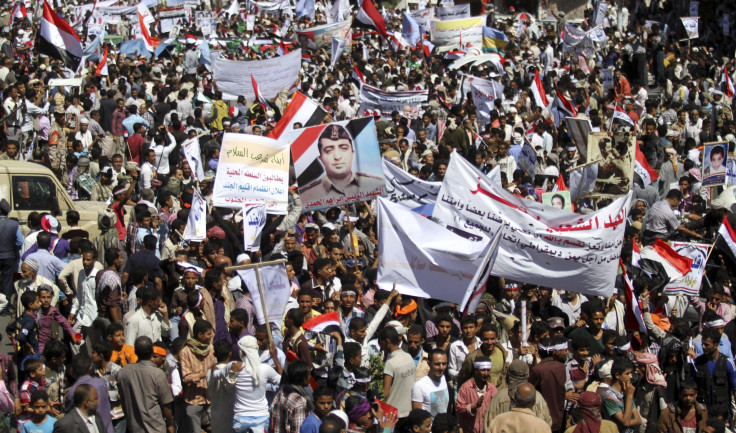Anti-Houthi Protests Break Out In Yemen As Western Countries Cut Diplomatic Ties

Protests have broken out in the Yemeni cities of Sanaa and Taiz after Shia Houthi rebels announced their takeover of the country last week, Reuters reported. On Wednesday, the United States, Britain and France closed their embassies in the country over fears of ongoing violence.
Hundreds have gathered in the capital city of Sanaa to protest against Houthi fighters, who set up checkpoints and security details around government buildings they currently occupy. The militants reportedly tried to intimidate the crowds by firing shots in the air and thrusting daggers at protesters.
In recent months, the Iran-backed Houthi movement has seized several centers of power including the capital and government buildings, in what it calls a revolution. The rebels claim they will fix the country’s ailing economy, and remove rampant political corruption. However, other countries, including Gulf Arab countries, have called it a coup. And, in response to ongoing political instability, Washington appears to have cut off relations with the embattled country.
"Recent unilateral actions disrupted the political transition process in Yemen, creating the risk that renewed violence would threaten Yemenis and the diplomatic community in Sanaa," U.S. State Department spokesperson Jen Psaki had said Tuesday.
A senior member of the Houthi political arm, speaking anonymously to The New York Times, said the group regretted triggering the American exodus. “We didn’t want them to go, and we were ready to work with the American Embassy on measures that would ensure their protection and facilitate their work.”
Yemen has been without an official government since former president Abed Rabbo Mansour Hadi resigned in January, under pressure from the Houthi rebels. He has been effectively held under house arrest after the militants seized Sanaa.
Jamal Benomar, United Nations adviser on Yemen, has held meetings for the past three days, attempting to broker a power-sharing agreement between the country’s various political parties and the Houthis.
Mohammad Abulahoum, head of the Justice and Building party, told the Times: “This is the time we most needed the international community here. But maybe this will be a wake-up call to certain groups in Yemen.”
© Copyright IBTimes 2025. All rights reserved.





















